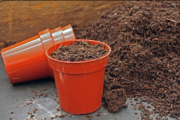Horticulture sector unites to boost peat-free gardening
As the growing season approaches, a coalition of expert organisations, including retailers, manufacturers, growing media manufacturers, growers, conservation charities, and trade bodies, have united to create clear guidance on how to grow successfully using peat-free compost. This initiative aims to help accelerate the UK’s transition away from peat.
The 20 organisations, brought together by environmental innovator Sizzle, include DEFRA, the Horticultural Trades Association, Garden Centre Association, British Growers Association, and the RHS. This collaboration comes in the wake of recent legislative delays and new research commissioned by Sizzle, which reveals that while 67% of gardeners care about sustainable composts, only 30% say they consistently buy peat-free. The new guidance seeks to close this gap and make it easier for gardeners to make sustainable choices.
Key Barriers to using peat-free compost
Lack of education and familiarity with how to use peat-free compost are key barriers. The research suggests over one in five gardeners (from novices to experts) are confused about the differences between compost types and what makes them sustainable. Additionally, 43% of gardeners stick to composts they know, a trend especially prevalent among those over 55 and more experienced gardeners. The new guidance aims to alleviate these concerns, giving consumers advice on choosing the right compost for their needs and addressing common issues with peat-free products, including overwatering, underfeeding, and incorrect storage.
Increasing the use of peat-free compost is essential as peat extraction is highly damaging to the environment. Peatlands are the world’s largest carbon store, with the UK as a leading contributor to emissions from their degradation5. Sadly, over 80% of our peatlands are damaged, and these ecosystems are critical for biodiversity, with 1 in 6 species now at risk of extinction. Despite this and 88% of amateur gardeners supporting a complete retail sales ban on peat-based products, many gardeners continue to buy peat-based compost.
Peat-free compost will look, feel, and smell different
Simon Blackhurst, Project Director and growing media expert at Sizzle, said: “We know gardeners want to be more sustainable, but many hesitate to change their habits. Peat-free compost will look, feel, and smell different to peat-based compost and needs a slightly different approach, which is why our guide offers clear, simple steps to support gardeners at all levels to successfully adopt peat-free practices. It is essential that the information we provide to the public is consistent, which is why we are calling on even more organisations to share this advice on their websites, in-store, and on social media under the hashtag #PeatFreeSuccess”.
Nature Minister, Mary Creagh, emphasized the importance of this collaboration: “Our peatlands play a crucial role in our ecosystems, acting as our largest terrestrial carbon store, as well as providing vital habitats for our wildlife. This kind of collaboration across the horticulture sector is key to protecting our peatlands for the future. Gardeners are keen to do their bit to preserve our wonderful landscapes, and this new guidance will help to bridge the knowledge gap and make peat-free gardening achievable”.
“It is a really positive step…”
Professor Alistair Griffiths, RHS Director of Science and Collections, remarked, “It is a really positive step to have come together with so many organisations to help provide these top tips for gardeners, to make sure they can grow successfully peat-free. At the RHS, we know the simple action of choosing peat-free compost keeps peat in the ground, where it has a vital role in storing carbon, regulating water in the landscape, and as a habitat for wildlife. Gardeners can follow this guidance on the leaflets to get the best from peat-free compost and take an important action for our planet”.
Andy Smith at The Responsible Sourcing Scheme added, “Providing accessible, accurate information about peat-free composts is essential to building consumer confidence and supporting a successful transition to more sustainable gardening practices. By working collaboratively with retailers, manufacturers, NGOs, and industry bodies, we can help ensure that gardeners receive the guidance they need to select and use peat-free products effectively”.
The guidance will be rolled out starting 18 February at The Garden Press Event.

